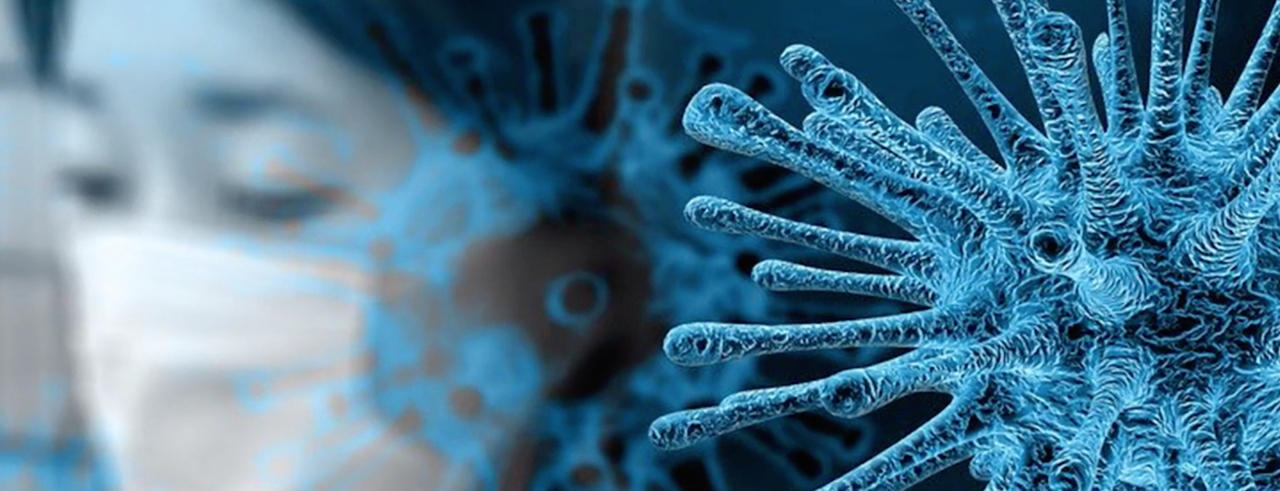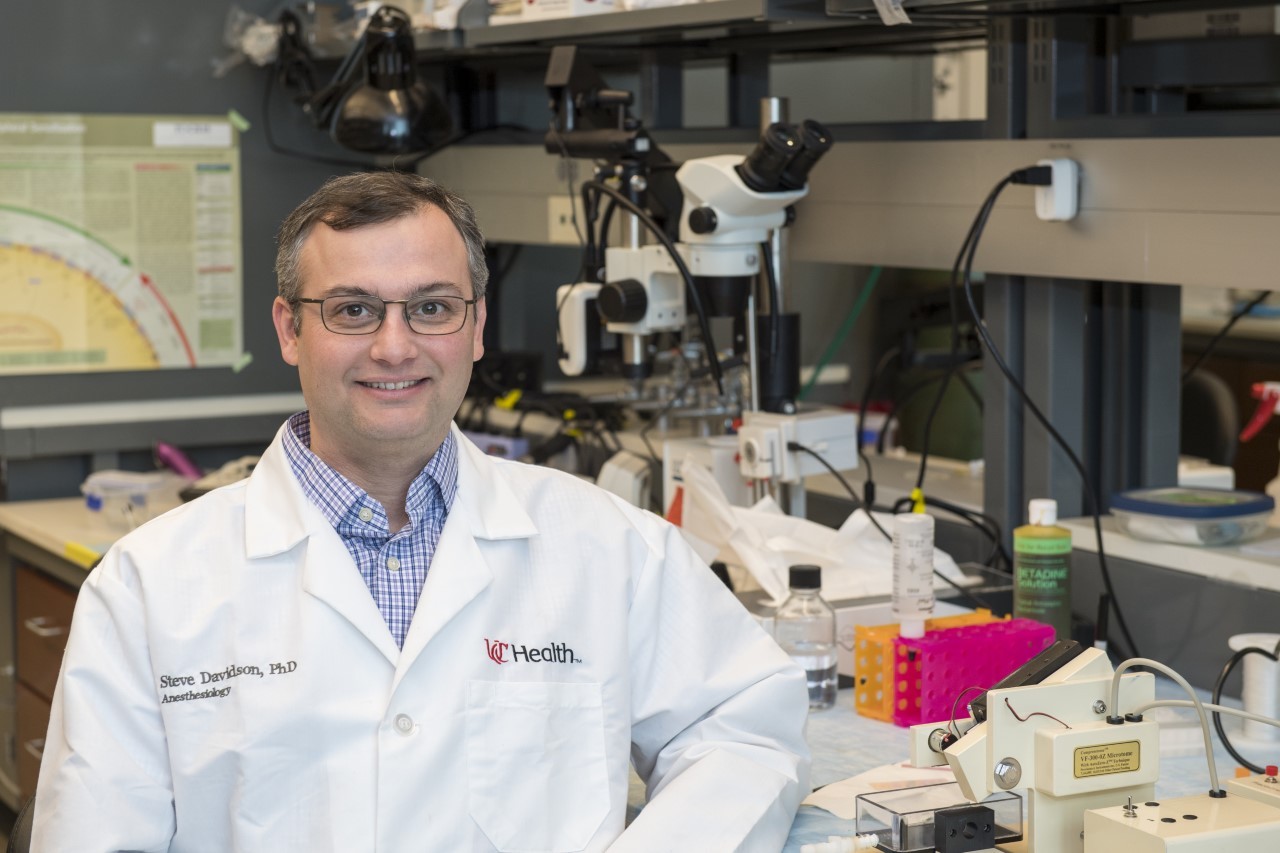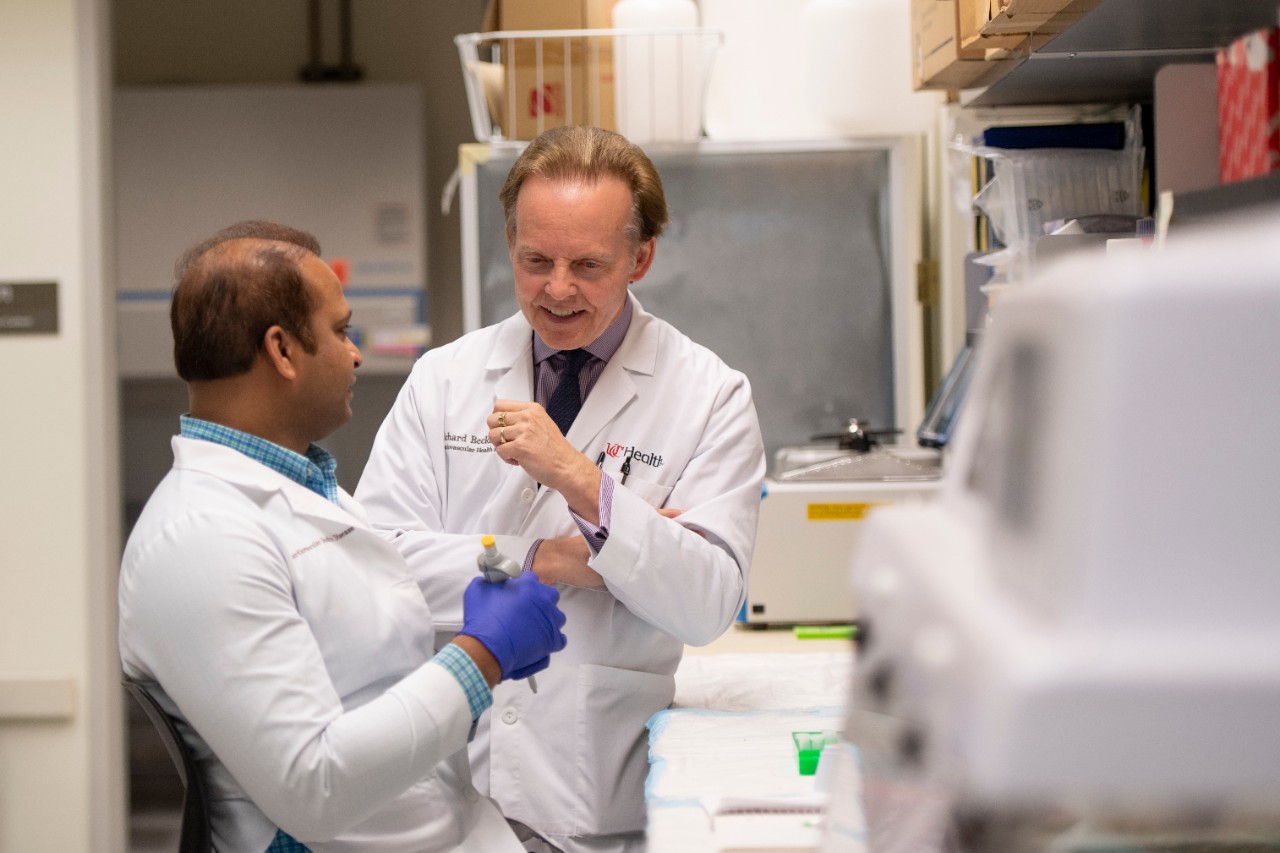
Conquering COVID-19
UC College of Medicine and UC Health fight the coronavirus through innovative research
Researchers at UC are doing what they do best in the face of this pandemic: discovering solutions.
Below are some of the ways in which UC and UC Health researchers are making strides to overcome COVID-19 through novel programs, innovative research and collaborative teams.
"I'd be shocked if we don't have a major contribution to make here for the national and international community," says Dr. Brett Kissela, Albert Barnes Voorheis chair and professor of the UC Department of Neurology and Rehabilitation Medicine, senior associate dean for clinical research at the UC College of Medicine and UC Health physician.
UC, UC Health administer first doses in COVID-19 vaccine trial

A pharmacist prepares a dose of the COVID-19 vaccine or a placebo. Photo/Colleen Kelley/UC Creative + Brand
Clinicians at the University of Cincinnati College of Medicine and UC Health have administered the first doses in a groundbreaking clinical trial that will evaluate the effectiveness of a vaccine for COVID-19, the respiratory illness caused by the novel coronavirus SARS-CoV-2.
COVID-19 antibody test may be more reliable

Steve Woodle, MD, William A. Altemeier Chair in Research Surgery at the UC College of Medicine and director of solid organ transplantation for UC Health. Photo/Colleen Kelley/UC Creative + Brand
A University of Cincinnati transplant surgeon is part of a national team of researchers that has helped develop a serological test targeting transplant patients that may better detect antibodies in response to SARS-CoV-2, the novel coronavirus causing COVID-19.
Addressing anxiety with an app

Jeffrey Strawn, MD, an associate professor and anxiety expert in the Department of Psychiatry and Behavioral Neuroscience at the University of Cincinnati.
As a way to help squash uncertainties surrounding the pandemic, provide knowledge about anxiety related to COVID-19 and help people realize they are not alone, experts at the University of Cincinnati and Cincinnati Children’s Hospital Medical Center have worked in collaboration with the chatbot developer Wysa to create a new, free “Covid Anxiety” smartphone app.
Ergonomics of home offices during the pandemic

Kermit Davis, PhD, is a professor in the UC College of Medicine. Photo by Colleen Kelley/UC Creative + Brand.
When working at home, it’s good to have a break, possibly every 30 minutes, to stay healthy and minimize injury to your back, shoulders and arms, says Kermit Davis, PhD, an expert in office ergonomics at the University of Cincinnati College of Medicine. “The body doesn’t like static postures continually,” says Davis, a professor in the UC Department of Environmental and Public Health Sciences. “You don’t want to do all sitting or all standing all the time. You want to alter your position and change it up throughout the day.”
Controlling inflammation in COVID-19 patients

Steve Davidson, PhD, shown in a UC College of Medicine laboratory. Photo by Colleen Kelley/UC Creative + Brand.
Steve Davidson, PhD, assistant professor of anesthesiology in the UC College of Medicine, is trying to understand what occurs when COVID-19 invades the lungs, causing the body’s immune cells go into overdrive. He along with collaborators published a study in the journal Brain, Behavior, and Immunity that identified interactions between immune cells and nerves in the lungs that cause a COVID-19 patient’s condition to worsen.
Preliminary findings show immunotherapy safe for patients with cancer, COVID-19

Trisha Wise-Draper, MD, PhD, an associate professor of medicine, Division of Hematology Oncology, at the UC College of Medicine, UC Health oncologist and medical director of the UC Cancer Center Clinical Trials Office, in her lab. Photo/Colleen Kelley/UC Creative + Brand
Preliminary data from researchers at the University of Cincinnati Cancer Center show that immunotherapy doesn’t necessarily worsen complications for patients with both COVID-19 and cancer. This data was presented at the American Association for Cancer Research Virtual Meeting: COVID-19 and Cancer, Monday, July 20.
Novel use of anti-rejection medication for COVID-19

Photo/Colleen Kelley/UC Creative + Brand
Researchers at the University of Cincinnati are testing a commonly used drug, called sirolimus, to determine its safety and efficacy in treating hospitalized patients with COVID-19 pneumonia in the trial. The research trial will examine the Food and Drug Administration-approved medication that is most commonly used to prevent organ rejection in patients with kidney transplants. It is also FDA-approved for the treatment of a rare lung disease, LAM.
COVID-19 and the central nervous system

Ahmad Sedaghat, MD, PhD, shown in the UC Gardner Neuroscience Institute. Photo by Colleen Kelley/UC Creative + Brand.
Depressed mood or anxiety exhibited in COVID-19 patients may possibly be a sign the virus affects the central nervous system, according to an international study led by University of Cincinnati College of Medicine researcher Ahmad Sedaghat, MD, PhD. These two psychological symptoms were most closely associated with a loss of smell and taste rather than the more severe indicators of the novel coronavirus such as shortness of breath, cough or fever, according to the study.
Disinfection of masks

Sergey Grinshpun, PhD, advises against using two sterilization methods to clean disposable masks and N95 respirators. Photo/Colleen Kelley/UC Creative + Brand
A UC researcher is advising against using two widely available sterilization methods to clean disposable surgical masks and N95 respirators for reuse in the midst of the coronavirus pandemic. Scarcity of personal protection equipment in medical settings has led many health systems to consider sterilizing and reusing masks developed initially as disposable items, says Sergey Grinshpun, PhD, director of the University of Cincinnati Center for Health-Related Aerosol Studies and professor in the UC Department of Environmental and Public Health Sciences.
Decrease in emergency visits for stroke care during pandemic

Opeolu Adeoye, MD, and Pooja Khatri, MD, co-senior authors of the research on a reduction in emergency hospital visits for stroke/Photo/Joe Fuqua II/UC Creative + Brand
Immediately following the announcement of COVID-19 prevention measures in March, the Greater Cincinnati Tristate region saw a nearly 40% decline in patients coming to the hospital in time for emergency stroke care, according to researchers from the University of Cincinnati College of Medicine and Cincinnati Children’s Hospital Medical Center.
Opening a COVID-19 vaccine trial

Carl Fichtenbam, MD, infectious diseases expert at UC and UC Health. Photo/Joe Fuqua/UC Creative + Brand
Researchers at UC and UC Health will host a Phase 3 clinical trial to evaluate the effectiveness of a vaccine for COVID-19, the respiratory illness caused by the novel coronavirus SARS-CoV-2.
Creation of an app that tracks the coronavirus

The COVID-19 Watcher helps track cases of the novel coronavirus in Cincinnati and beyond. Photo/Colleen Kelley/UC Creative + Brand.
Two University of Cincinnati students have developed an interactive dashboard which shows COVID-19 cases and deaths in Greater Cincinnati and other major U.S. cities. Known as the COVID-19 Watcher, it joins a list of options available to the public to track the novel coronavirus. Benjamin Wissel, a student in the UC College of Medicine’s Medical Scientist Training Program, and Pieter-Jan Van Camp, MD, a doctoral student in the Biomedical Informatics Graduate program, published research on their dashboard recently in the Journal of the American Medical Informatics Association.
COVID-19 and the brain

Photo/Unsplash
A study by University of Cincinnati researchers and three Italian institutions reviewing neuroimaging and neurological symptoms in patients with COVID-19 may shed light on the virus’s impact on the central nervous system. The findings, published in the journal Radiology, reveal that altered mental status and stroke are the most common neurological symptoms in COVID-19 patients, which authors say could help physicians notice “red flags” earlier.
Published research on COVID-19 and heart conditions

Richard Becker, MD, (center) shown with colleague. Photo/Colleen Kelley/UC Creative + Brand.
Richard Becker, MD, director of the UC Heart, Lung and Vascular Institute, published research about COVID-19 associated coagulopathy in the Journal of Thrombosis and Thrombolysis. He discussed his findings and the impact COVID-19 is having on the lungs and cardiovascular system in several media interviews.
Studying how COVID-19 affects the heart

Sakthivel Sadayappan, PhD, is studying how COVID-19 can impact the function of the heart. Photo/Colleen Kelley/UC Creative + Brand
Researchers are finding about half of all patients with COVID-19 admitted to an intensive care unit have heart damage. The troubling trend is why a team of UC researchers is using a $50,000 grant from the UC College of Medicine to understand how the SARS-CoV-2 virus, the pathogen of COVID-19, impacts heart cells. Sakthivel Sadayappan, the grant’s principal investigator, Dr. Richard Becker and Dr. Donald Lynch are leading this effort.
By the third day, most with COVID-19 lose sense of smell

Photo/Unsplash
A University of Cincinnati researcher says a study of COVID-19 patients shows loss of the sense of smell is most likely to occur by the third day of infection with the virus. Most of these patients also experience a loss of the sense of taste. Dr. Ahmad Sedaghat, an associate professor in the UC College of Medicine’s Department of Otolaryngology-Head and Neck Surgery and UC Health physician, published these findings in the scholarly journal Otolaryngology-Head and Neck Surgery.
Finding ways to help patients with cancer, COVID-19 - and both

Dr. Trisha-Wise Draper is leading two clinical trials examining ways to study and help patients with cancer and COVID-19. Photo/Colleen Kelley/UC Creative + Brand
The UC Cancer Center is joining a consortium of 100 cancer centers and other organizations to collect data about patients with cancer who have been infected with COVID-19 and to make available information about this especially vulnerable population. The UC center is also participating in another study, using blood samples from patients with cancer taken from the UC COVID-19 biorepository, to examine how certain therapies may impact outcomes for patients with COVID-19 and those with both cancer and the coronavirus.
Providing guidelines to treat stroke during the pandemic

Dr. Aaron Grossman and Dr. Matthew Smith co-authored a paper in the journal Stroke which provided guidelines on treating patients during the COVID-19 pandemic. Photo/Tommy Campbell/UC Health
UC stroke researchers released a new report, published in the journal Stroke, recommending the proper protocol for delivering lifesaving treatment to stroke patients during the COVID-19 pandemic. The paper is timely as more data emerges that patients with COVID-19, even young, otherwise healthy patients, are experiencing strokes.
Providing COVID-19 specimens for research

Photo/Colleen Kelley/UC Creative + Brand
The University of Cincinnati College of Medicine and UC Health are collecting specimens from COVID-19 patients to be stored as part of the Cincinnati COVID-19 Repository effort. The specimens will be used by researchers to learn more about COVID-19 and possible treatments and preventions for not only this disease but possibly diseases of the future. This effort also includes Cincinnati Children's Hospital Medical Center and the Cincinnati Department of Veterans Affairs Hospital Medical Center.
Researching how COVID-19 impacts the liver

Dr. Kenneth Sherman is studying how COVID-19 could impact the liver. Photo/Colleen Kelley/UC Creative + Brand
An attack on the respiratory system causing severe cough and shortness of breath is what many of us associate with the worst effects of COVID-19. But a University of Cincinnati and UC Health researcher says damage to the liver is also an area that needs more study. About 50% of COVID-19 patients in China and Italy saw inflammation of the liver, a characteristic of hepatitis.
Hosting over 30 clinical trials to study new treatments

Photo/Colleen Kelley/UC Creative + Brand
The UC College of Medicine and UC Health are moving forward with a number of clinical trials to examine potential treatments for COVID-19. Currently, they are considering over 30 projects to determine the best course of action for patients. Dr. Brett Kissela says the clinical trial approval process is being expedited because of the urgent need to find treatments.
Celebrating the first plasma donors

Photo/Hoxworth Blood Center
On Friday, April 17, two recovered COVID-19 patients in the Cincinnati area rolled up their sleeves to help in the fight against the coronavirus. Mohammed Alagha and Dr. Robert Ernst, a UC College of Medicine faculty member and UC Health physician, were the first two individuals to donate convalescent plasma that could help the most critical COVID-19 patients in the Tristate area.
Awarding funds for novel COVID-19 studies

Photo/Colleen Kelley/UC Creative + Brand
Understanding that time was of the essence in combating COVID-19, UC and its College of Medicine’s Office of Research conducted a rapid review and distribution of $425,000 in novel pilot grants to researchers, focusing on eradicating the disease. The Special Coronavirus (COVID-19) Research Pilot Grant Program was established to quickly support the development of innovative studies to contribute to knowledge of the virus’ genetic makeup and progression and how it affects various populations.
Opening the first protocol, alongside the Mayo clinic, to find a treatment

Photo/Hoxworth Blood Center
The UC College of Medicine and UC Health are following a research protocol from the Mayo Clinic to take “convalescent plasma,” or plasma obtained from those who have recovered from the virus, and administer it to the sickest patients with COVID-19.
Your nose might know: How COVID-19 could impact sense of smell

Dr. Ahmad Sedaghat published research showing that a loss of smell could mean a COVID-19 infection. Photo/Colleen Kelley/UC Creative + Brand
A University of Cincinnati ear, nose and throat specialist says your nose may hold a clue in identifying COVID-19. The loss of smell may be a key indicator. Dr. Ahmad Sedaghat, an associate professor in the UC College of Medicine’s Department of Otolaryngology-Head and Neck Surgery and UC Health physician, published these findings in the scholarly journal Laryngoscope Investigative Otolaryngology.
Worldwide media look to UC experts on coronavirus

As the spread of the coronavirus continues around the world, local, national and international media outlets are turning to experts from UC to help them cover the story.
Impact Lives Here
The University of Cincinnati is leading public urban universities into a new era of innovation and impact. Our faculty, staff and students are saving lives, changing outcomes and bending the future in our city's direction. Next Lives Here.
Stay up on all UC's COVID-19 stories, read more #UCtheGood content, or take a UC virtual visit and begin picturing yourself at an institution that inspires incredible stories.
Related Stories
U.S. Bank joins UC’s 1819 Innovation Hub
December 18, 2024
U.S. Bank, a global leader in banking and financial services, will join the 1819 Innovation Hub at the University of Cincinnati in January 2025.
UC receives $3.75M in federal funding for K-12 mental health...
December 18, 2024
A three-year, $3.75 million grant from the Department of Education aims to address critical gaps in the mental health and educational landscape by providing tuition stipends for UC graduate students majoring in school and mental health counseling, school psychology and social work.
Winter can bring increased risk of stroke
December 18, 2024
The University of Cincinnati's Lauren Menzies joined Fox 19's morning show to discuss risk factors for stroke in the winter and stroke signs to look for.
